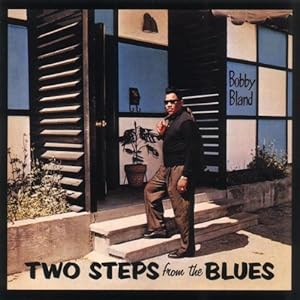Two Steps From The Blues was Bobby Blands' first album release, issued in 1961 on Don Robey's Duke record label. Previously Bland had shared an album with label and touring mate Junior Parker called Blues Consolidated. Most of the material for Two Steps From The Blues was assembled from two recording sessions in 1960, one in August and the other in November these sessions were held in Chicago. They represent a landmark in the development of rhythm & blues and as a precursor to soul music. Bland was in my opinion more adept that any other vocalist of incorporating different styles, he had the ability of a blues shouter, a ballad crooner and a sanctified gospel singer all rolled into one. Bobby also had the good fortune to have an amazing backing unit which was just as influential in shaping the direction of R&B and soul. Led by saxophonist and bandleader Joe Scott, who was consistently able to provide the right setting for each Bland performance. The band also featured guitarist Wayne Bennett who played with great subtlety, legendary drummer John 'Jabbo' Starks who added a funky syncopated backbeat and bassist Hamp Simmons.
The opening title track is a mournful blues with a big horn section opening that gently swells over Bland's appropriately understated delivery. Something that is a feature of the whole album is the crisp sound, and how tight the band is, the horn section is in sync there is nothing ragged about the delivery. Cry Cry Cry has a great sax solo from Scott who plays the foil to Bland's impassioned cry, also a nice opening from Bennett who showed that he was more than capable of ragged blues solos. Wayne Bennett was a vital component of the Bobby Bland sound, his playing veered towards a jazz style, his ability to play blues but also more melodic and intricate fills gave an extra dimension to Bland's sound.
Don't Cry No More comes from the November sessions and sees the final transformation of Bland from strictly blues vocalist to emerging R&B/soul powerhouse, this uptempo number had some great drumming from Jabbo Starks, in the middle eight it's just drummer and vocalist with Starks hammering out a funky syncopated beat. Lead Me On was recorded the previous year and provides a dramatic setting for Bland to really express himself. This was the period when Bland was able to fully realise his vocal ability, he has his own melisma, he wrings every bit of emotion from the ballad. The orchestration from Joe Scott is outstanding, building the tempo without it become mawkish.
I Pity The Fool is just classic R&B starting off slow with what I would describe as a spilt tempo, Bland takes hold in the chorus with the horns matching him with some sharp fills. Bennett and Scott also match each other towards the end of the song, with the rhythm section driving the song. Hamp Simmons would be unknown to most people and I know little about his career but he certainly sticks tight to to Stark's backbeat which is what I like about R&B style bass players, everything is kept simple. I've Just Got To Forget You has bland in Uptown soul mode, it's a jazz styled number with Bennett providing a nice rhythm part similar to what someone like Grant Green was doing around that time. Little Boy Blue is from an earlier session in 1958 and is a strong example of his powerful throaty style, his blues shouter style was prominent in his early recordings. St James Infirmary and I'll Take Care of You from the 1960 sessions have that familiar dramatic style, what stands out on St James Infirmary is the solo sounding very similar to a New Orleans funeral march, with those behind the beat horns! On I'll Take Care of You it's the swirling melody of a hammond organ.
Bobby Bland would continue to dominate R&B and soul music with a number of classic albums stretching into the late 60's, when due to financial concerns he was no longer able to maintain a large band. Around this time both Joe Scott and Wayne Bennett left to pursue other projects, John Starks had already left in 1965 to join James Brown, and push Brown further into his funk explorations.

No comments:
Post a Comment